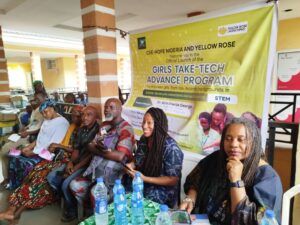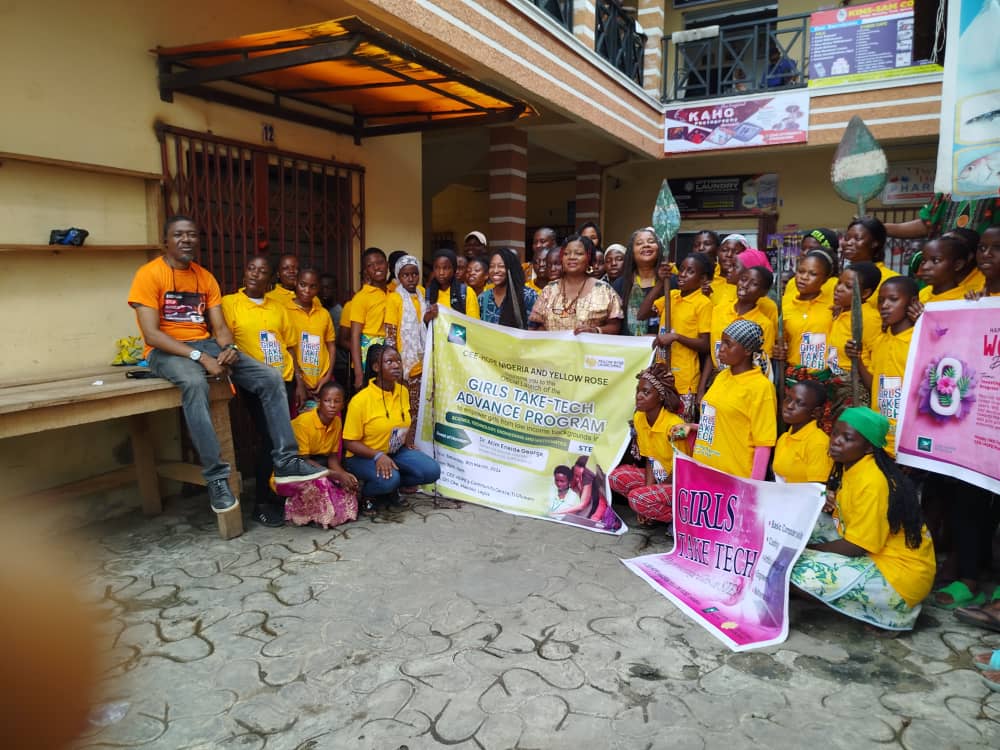A tribe of computer programmers, coders and experts in Artificial Intelligence is being born in many low income communities in at least three states.
The effort is being spearheaded by a Lagos-based non governmental organization (CEE-HOPE) in collaboration with another non-profit, Yellow Rose. It is tagged; ‘Girls Take-Tech Advance Program.
At the launch of the initiative in Makoko, a suburban community in the Yaba area of Lagos, CEE-HOPE executive director, Betty Abah, said the aim is to empower girls from low income backgrounds in Science, Technology, Empowerment and Mathematics (STEM).
Motivating the girls beneficiaries at the commissioning of the program at the CEE-HOPE community centre in Makoko, retired U.S. diplomat and Fulbright Schola, Dr. Atim Eneida George charged the girls to take the opportunity seriously.

According to the diplomat, what the human mind can conceive and believe, with God it is achievable.
“You are at the beginning of a fantastic journey. When you stumble, get up and keep going,” she said.
She charged further that, “Learning is an important tool that can take you to heights and you can have your heart desires.
“We have a spark of light in us and we have to take time each day to meditate. It doesn’t take a kobo to meditate, it doesn’t need electricity, you only need a quiet place,” she said.
The diplomat who said she lost her both parents at about age ten, told the girls nothing is impossible to a willing and committed heart.
“Remember this is the key: conceive it, believe it and you can achieve it.
“An educated woman builds the capacity of the family. Educated woman makes the difference because when you educate a man, you educate an individual but when you educate a woman, you educate a nation. Education is to draw out what you already have, God gave you ability and education helps to refine that ability. That is the reason you must be clear about your purpose. When preparation meets opportunity, they produce success,” she said.
Lerins Williams, a musicology expert, researcher and also Fulbright Scholar encouraged the girls to stay focused.
She said: “I am a researcher and I want everyone of you to look up to a woman that has inspired you and you ought to be that person for someone else,” she said.
She also urged them to write their specific dreams and work at them.
“I want you to daily write down your specific dreams. I have traveled to different places, I speak different languages, you too can become who you want to become,” she admonished.
Abah, in an interview with journalists, said the initiative is connected to the International Women’s Day which held on March 8.
“The month of March generally is women’s month, the 8th of March is the International Women’s Day and all activities revolve round empowerment of women and girls.
“There is a lot to do to address the issues of marginalisation of women and girls that is why we found it necessary to launch this project called Girls Take-Tech,” she said.
Shedding more lights, Abah said, “We initially did an ICT Empowerment program in 2017 but this is an advanced program. We are looking at the possibility of empowering girls, not just with basic computer skills that we have been doing but scaling it up to coding, Artificial Intelligence and very advanced form of computer knowledge because this is an ICT driven age and we cannot afford to have girls left behind.”
On why the project is focusing on girls from low income communities, Abah said, “We are focusing on girls from low income communities because usually having to access computer and ICT and STEM education is a major challenge to them because most of the time they are in public schools where they don’t have enough computers or no computer at all.”
She also revealed plans to take the program further into other states.
“We are going to start with Lagos and in the next couple of months we are hoping to move to Abuja targeting girls in low income communities and they don’t have to be in science class alone. They all need these skills regardless of their subjects.
On the number of girls the project is targeting, Abah said, “We are hoping that before the end of the year we should have more than 1,000 girls. We don’t want to make it like haphazard program but we want to make it meticulous and continuous so it can be impactful. We are targeting 1,000 girls in three states and we don’t want to be over ambitious to say 10,000 girls that’s why we are being focused to target just 1,000 girls we know we can succeed with.”
Also at the event was Ayodeji Aduloju, a trainer in coding who said scientifically, girls have more advantage in grasping the coding knowledge.
“Coding is very important for girls and science has proved that they have the biological advantage,” Aduloju said.
“The founder of coding is a woman and biologically speaking, the woman’s brain is wired up for coding because the right and left hemisphere of a woman’s brain can interact more easily compared to that of the male,” he said, encouraging more girls to go into coding to get trained and maximise their advantage.
Meanwhile, Aduloju who had trained so many girls in coding is not happy that Nigeria has not provided enough opportunities for girls in coding.
“Our trainings have been sustainable but the government has not provided enough encouragement. Some of my students I taught in Monkey village, Opebi in Lagos State as facilitated by CEE-HOPE had gone far in coding but unfortunately the government in 2020 demolished the low income or informal village without notice.
“The computer center established for the children by CEE-HOPE was demolished without any of the computers recovered yet these girls have no access to computers in their regular schools. This is very discouraging for development of human capital. The government, individuals and alumni associations of schools should invest in ICT infrastructure to enhance learning,” he advised.










More Stories
Zelensky says he is ‘ready’ to resign as Ukraine president
In mass firings, Elon Musk’s DOGE demands U.S. federal employees detail work done in previous week or turn in resignations
Kidnappers abduct 60-year-old patient from Kano Neuro-Psychiatric hospital